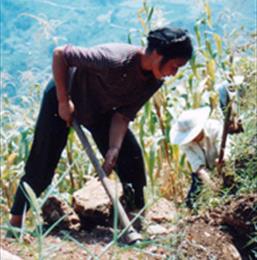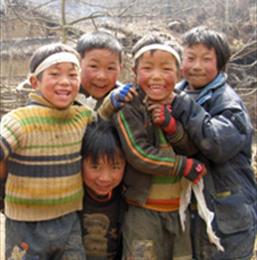Annual Review 2001
1st January 2002
This year, DORS has met with many changes that signify new directions for our organisation. Apart from continuing to implement grassroots poverty alleviation measures in Hanyuan County, we have also expanded into the neighbouring county and increased the scope of our work to include various capacity building initiatives. As we move into our 6th year of working in community development, we look forward to collaborating with old partners and forming links with new ones. This review covers the financial year of 1 April 2001 to 31 March 2002.
Project Progress:
This year has seen DORS expand into Ganluo County, which is part of Liangshan Yi Minority Prefecture. While continuing with our work in the 17 villages of Hanyuan County, we have begun implementing various integrated rural development projects in two new villages in Ganluo.
We completed two community forestry projects this year that were begun at the end of last year, in two villages of Pianma Township and in three villages of Nimei Yi Minority Township, and started one new project in Fuyou Village. We also experimented with new methods of implementing forestry projects, providing in-depth training sessions for villagers, which included site visits to other forestry plots. In total, over 100,000 saplings were planted this year.
Education continues with our support for school fees. This year education support was also extended to two new villages in Ganluo County. In total we supported over 500 children in primary, middle and technical schools, in 14 villages, 57% of which were females. We also assisted in the construction of a dormitory for teachers in Wanping Village to enable them to attract qualified teachers to this remote area.
As the women's micro-credit funds revolve to benefit different women, we expanded participation to three new villages this year, primarily as an experiment and in conjunction with other projects.
During the past year, in addition to designing and implementing drinking water supply systems in two villages, we have also embarked on a new initiative of working towards the maintenance and sustainability of past water supply systems that we have supported. This includes detailed evaluations of over 30 supply systems and arranging training sessions for villagers on water system maintenance and management.
DORS has increased its focus on rural energy projects this year, which began as an experimental run last year. The expansion of fuel-efficient stoves has been popular among villagers, to date over 80 have been built.
Recently, the Provincial Government approved a plan to construct a hydropower station in Hanyuan County. This project will take several years to complete, and initial preparations have already begun. This has affected a number of DORS projects in the area, as some of the villages will be relocated. This has also delayed our selection of new villages in Ganluo as the neighbouring areas are also subject to relocation.
One of the more indirect ways our organisation is able to impact rural development is through the various avenues of publicity that we have been involved in last year. Two separate Central Television (CCTV) programs spent time filming our work in the villages. One was Dong Fang Shi Kong of CCTV, and the other was recently aired on March 8 as part of a program for International Women's Day, reaching an audience of 300,000,000 people. In addition, we continue to receive support from our partner, the Provincial Poverty Alleviation Office. This year, DORS was not only invited to attend the Provincial Government's meeting to launch the new 10-year poverty alleviation plan, but also accepted a request from the Governor of Sichuan Province to meet with our Director, Rose Acock, in support of our work. Similarly, we were able to participate in various organised conferences, including the NGO conference in Beijing and the Kadoorie Symposium on Participation and Partnership. DORS sees this as a chance not only to highlight the importance of using participatory methods in community development in our own work but also in the wider development field.
Capacity Building:
As most of you know, this year has been one of redefining and reshaping the direction and aims of DORS within the development field. Last summer, as part of a Canadian Civil Society funded initiative, we implemented 3 separate training sessions in participatory community development for 50 village and township representatives from our project sites. This year, we are also working more with local villagers in managing projects, including assisting local communities to apply for funding in implementing their own projects.
Subsequent to our Strategic Planning Meeting held in August, in which we outlined our intent to move towards building the capacity of local communities to empower themselves through training, we have been exploring new avenues of creating a more sustainable impact in community development.
Over the summer, DORS welcomed a number of visitors to Hanyuan who were interested in learning more about the way we work. Members of WWF Sichuan project, including township and village members of their project locations spent a 3-day visit in Hanyuan touring some of our project sites. Later in the year, we were also visited by members of township and village representatives from the Chongqing Poverty Reduction Project, an AusAid funded initiative. Each group was able to meet with other villagers and exchange ideas, as well as learning about our participatory methods in implementing projects. In addition to our group visitors, DORS also welcomed local Chinese individuals working with the Trace Foundation to come and train with us through short-term internships on participatory project management.
Volunteer News:
This year DORS has had 3-4 volunteers working full-time in Hanyuan County. In July, Caroline Legros began working with us as a Project Assistant after having completed her thesis for her Master's degree program. Rose Acock, our Director, completed her courses with Open University as part of a long-distance learning program. Later last year, she also accepted a part-time position with Trace Foundation as the Senior Programme Officer, and will be sharing her time between Hanyuan and Tibet. Our most recent addition is Rita Bonomally as the Office Manager/Project Assistant, who joined us in March 2002. We also had a short-term volunteer, Felix AuYeung, who spent two months assisting with the construction of fuel-efficient stoves in Nimei Township. DORS Trustees Derek and Barbara Acock spent a few days visiting some of our project sites around Hanyuan. Guo Yumei, Social and Community Forester, and Elsa Fan, Project Officer, continue as full-time volunteers with DORS.
Plans for 2002:
DORS will continue implementing poverty alleviation measures in and around Hanyuan and Ganluo counties. In addition, we have extended an invitation to organisations who would be interested in sending local Chinese staff to train and work with us in hopes that they will continue to work in this field and build a more sustainable base for development work.
Directing Donations for Projects: This year, 85% of all DORS expenditure was spent directly on community development projects. The remaining 15% were expended on running costs for the organisation, including overhead costs and full-time volunteer support.
Thanks:
We would like to thank all our friends, funders and colleagues for their part in making these projects possible. As always, we appreciate the long-standing support we have been given and look forward to continuing these relationships into 2002.


